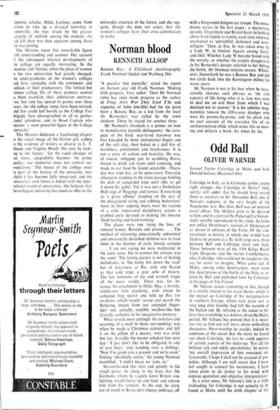Norman blood
KENNETII ALLSOP
Banana Boy : A Childhood Autobiography Frank Norman (Seeker and Warburg 30s)
`A peculiar boy mentally,' stated the report on thirteen year old Frank Norman. 'Making little progress. Very sullen.' Then Mr Norman (who has since made progress as the author of Fings Ain't Wot They Used Tbe and vignettes of Soho low-life) had for six years been a Banana Boy, as a kid from the local Dr Barnardo's was called by the town children. There he stayed for another three.
Mr Norman's chronicle is a primer on how to manufacture juvenile delinquents: the cara- pace of the hard, scar-faced tearaway was first kneaded by bony institutional fingers out of the soft clay, then baked in a dull fire of harshness, punishment and lovelessness. It is not a story of sadism and brutality. He was, of course, whipped, put to scrubbing floors, forced to drink salt water until vomiting, and made to eat food he found uneatable—Thurs- day was tripe day, so he spent every Thursday afternoon standing in the stone passage holding his dish of congealed tripe until able to get it down his gullet. Yet it was not a Dotheboys Hall orgy of floggings and torture. Earmarking as 'a grave offence' standing on the seat of the playground swing and rubbing bedwetters' noses in their sopping sheets were the routine of a cold, impersonal disciplinary system, a crabbed piety devoted to making the inmates `God-fearing and hard-working.'
The places were run 'along the lines of remand homes, Borstals and prisons . . . The method of reforming educationally subnormal and emotionally disturbed children was to treat them in the manner of early lunatic asylums . . . I am not saying we were maltreated in the same sense, but in essence the attitude was the same.' The lasting picture is not of boiling melodrama in 'the loony bin down the road' but of dreariness as flat, stale and flaccid as that cold tripe, a grey ache of misery. The few moments of joy and warmth linger all the more vividly. There was, for in- stance, his attachment to Hilda May, a moody, withdrawn little psychotic, with whom he collected frog spawn and held up flies for swallows, which would 'swoop and snatch the fluttering insects from our extended finger- tips'—not, actually, credibly swallow-like but lyrically authentic in his imaginative memory.
What reveals most cuttingly the isolation and yearning of a waif in those surroundings was when he made a Christmas calendar and left it on the pillow of a master, who was strict but fair. Irritably the master rebuked him next day—'I just don't like to be obligated to any of you boys,' and, handing over a shilling: `Now I've given you a present and we're even.' Feeling 'absolutely rotten,' the young Norman mumbled: 'I didn't mean no 'arm, sir.'
Shaven-headed (for nits) and spindly in his rough jersey, he clung to the hope that the Germans, whom he vaguely knew Britain was fighting, would hurry up and land, and release him from his torment. At the end, he arts out of reach of Barnardo's clumsy embrace, off
with a fairground dodgem car troupe. The melo- drama occurs in the first pages: a mysterious episode. Illegitimate and Bristol-born, he bobbed about from family to family, each time returned unadopted as 'untruthful, dishonest and unin- telligent.' Then, at five, he was taken over by a Lady W, in Onslow Square among butler and chef. Whether Lady W became bored with the novelty, or whether the cryptic disapproval in his Barnardo's dossier referred to her hitting the bottle, Mr Norman remains unsure. Which- ever, thenceforth he was a Banana Boy and did not circle back into the Kensington milieu for many years.
Mr Norman is not at his best when he occa- sionally elocutes such phrases as 'the rich tapestry of life being what it is, fate was soon to deal me an evil blow from which I was destined not to recover.' It is his unbitter mag- nanimity toward the £30-a-year drudges who were his parents-by-proxy, and his plain and no purl account of the everyday life of an institutionalised child, which make this so mov- ing and delicate a book, his finest by far.










































 Previous page
Previous page